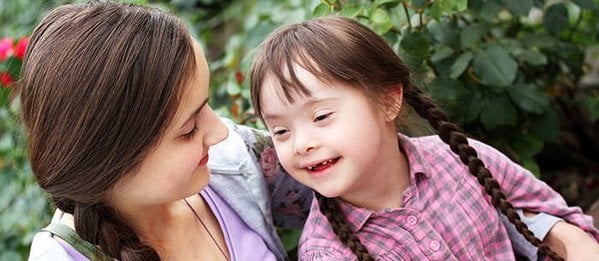“It is always difficult to find the right person to care for your child, especially when children are small,” says Michelle, mother of a 12-year-old with Down syndrome and leader of the Cape Cod Down Syndrome Support Group in Massachusetts. “Some children have feeding issues and safety issues, and some children can’t speak that well.”
Any parent looking for a caregiver will usually consider the following:
- Type of care needed — daily or just occasional
- Qualities sought in a caregiver
- Needs of the child or children
But, the parents interviewed need more than the just basics. They share specific areas of concern for the health and safety of their children with Down syndrome.
Physical safety
Uppermost in a parent’s mind is making sure that their child — or “the love of my life” as one parent puts it — is safe.
“My daughter used to open the front door, walk outside and ring neighbors’ doorbells,” says Cheryl, leader of the Massachusetts MetroWest Parents of Children with Down Syndrome group. She couldn’t emphasize enough to anybody watching her child that they needed to keep the door locked at all times.
Caregivers have to make sure children do not get into dangerous situations inside the home as well. This may mean that they need enough stamina and patience to keep the child busy and facilitate his or her play, says Michelle.
Other safety concerns can revolve around eating. B.D., whose son is now 6, used to remind baby sitters to pay close attention when he was eating to make sure he chewed — and didn’t choke on — his food.
Verbal communication
“It could be tricky for someone coming in cold,” says Mary, referring to strangers having difficulty understanding her daughter’s speech. Other parents echo that sentiment, but note that their child’s patience and good nature even when not immediately understood can help with the situation.
Because children may be harder to understand, using the same caregiver can be especially helpful so that a child’s speech (as well as habits) become more familiar to that caregiver.
Parents should inform their sitter if their child uses any specific signs or icons for communication. In addition, even though no one wants to overburden a sibling, having a more verbal sibling “interpret” can be extremely helpful.
Self-care issues
Self-care abilities may be slower to develop. Some children need help with toileting, or cues like “what comes next?” with activities such as showering and getting dressed.
So that everyone feels more comfortable, parents may look for a caregiver of the same gender as their child if a lot of personal help is anticipated or if their child is adolescent.
Medical issues
While most children with Down syndrome lead healthy lives, some are born with cardiac or intestinal problems, and/or develop other health issues.
Just as parents of a child without special needs would inform a caregiver about any current medical problems, parents of children with Down syndrome should be especially diligent about this. All medical contact information should be readily available along with contact information for friends and family, medical insurance information, and instructions for what to do in an emergency.
Attitude of sitter
In addition to keeping their child safe, parents want a sitter with a positive attitude, who appreciates how wonderful their child is and focuses on their strengths and not their challenges. As B.D. says about her son, “Just treat him like anybody else — he’s not that different!” And, when it comes to finding a caregiver for a child with Down syndrome, it’s the caregiver’s attitude that is key to establishing a successful care relationship. Many parents would rather have a caring, and engaged caregiver with less experience, over one with more experience but less warmth and enthusiasm.
Write it down
Lists can be very helpful, especially if they are brief and not overwhelming. B.D. used to leave a short, bulleted list of things she wanted a baby sitter to know, such as how specifically to help her child in the bathroom, a reminder to make sure his glasses were kept clean, and a reminder that he was capable of writing his own name (so sitters didn’t do it for him).
Finding child care
While their ideal caregiver might be a teacher with a special education degree or someone with prior special needs experience, some parents feel that if they can find someone with enthusiasm, energy, consistency, patience and/or maturity, they can train a caregiver themselves.
While a variety of child care options exist, some parents may feel most comfortable relying primarily on family and close friends. They may:
- Trade off with a spouse and take turns going to meetings or appointments.
- Ask local extended family members, such as grandparents, aunts, uncles, nieces and nephews for help.
- Trade sitting with other families in a similar situation. C.C., for example, found another family with a child with Down syndrome a few streets away. They felt comfortable leaving their children at each other’s homes.
- Have older children, if willing and capable, babysit for a younger sibling occasionally.
- Join a support group and meet other families to get advice and share information.
A final thought
You will find a caregiver who will not only adore your child, and appreciate all of his or her wonderful qualities and abilities, but will also be attentive to their special needs. The people who help you care for your children are also helping support the health and happiness of the whole family.
Helpful Links
National Down Syndrome Society
National Association for Down Syndrome
Deborah Elbaum, M.D. is a mother of three children and lives in Massachusetts.






